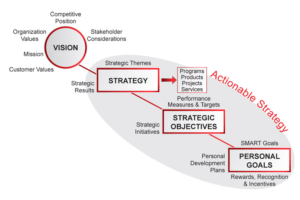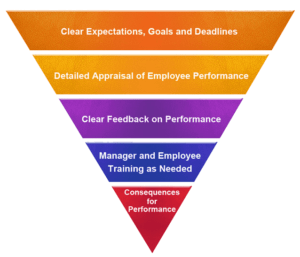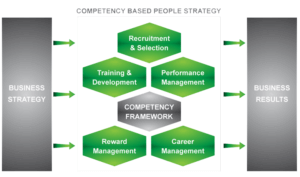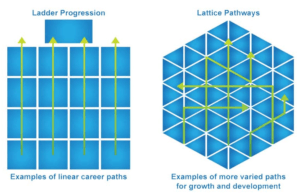ORGANIZATION EXCELLENCE
ORGANIZATION EXCELLENCE
evolving
- Aligning Vision, Strategy, and Execution
- Culture Transformation
- Value Alignment
- HR Branding and Employee Value Proposition
- Integrated Talent Management
- Performance Management and Rewards
- Competency Management
- Career Planning
- Inclusion and Diversity
ALIGNING VISION, STRATEGY AND EXECUTION

What is the CULTURE CODE of your company?
The culture of an organization is a collective expression of its Mission, Vision and Values. More often than not, the Value systems of an organization, get confined to glossy posters on the wall and flashy websites.
- What is your organization’s vision?
- What is the strategy that will help you achieve this vision?
- Which driver is impeding the performance of the entire organization?
- Is everyone within your organization aligned to the strategy and the goals that one needs to accomplish in order to meet the strategic objectives?
- How do you measure that your employees are delivering for the strategy of ‘tomorrow’ and not for that of ‘yesterday’?
A business without a ‘Vision’ is a business without a future. While it is great to have a vision statement that is stuck up on the wall, often the challenge is to translate it into ‘strategic objectives and ‘goals’ that are specific, time-bound, realistic, and achievable. And then measuring people against these goals is another major challenge.
There was a time when strategy would remain confined to the boardroom, and the rest of the organization was simply told what they needed to ‘do’ and not bother about the rest. However, organizations that continue to operate today in this mode soon perish. With grass root innovation being the essence of today’s progressive organizations, it is imperative that Leaders not only align people towards your vision and strategy but also they engage them to make it achievable and probably even more aggressive and dynamic.
We at Laureate help our clients right from drafting the vision, strategy, and goals to measuring the impact of these goals on their business performance while involving their significant resources in the process. Further, we help them with creating a performance-oriented culture that will smoothly enable the achievement of these goals and strategic objectives. With the outside-in perspective that we offer, our clients stand to build an organization that is poised for high performance, and seamless achievement of the vision.
CULTURE TRANSFORMATION

- What makes two organizations operating in the same space different in terms of their performance?
- What makes two organizations responding to the same market forces and competitive landscape respond differently?
- What makes one company with mediocre talent great at customer service and the other with the best talent just average at customer service?
- What enables one organization to sustain for decades and generations together and others perish soon after taking shape in spite of the best market scenario and talent potential?
Organization Culture is a multidimensional concept, but it can be defined as the behavioral norms of an organization based on the assumptions, values, beliefs, attitudes, and priorities of its Leaders and members. Few organizations intentionally and thoughtfully create or design their culture. Instead, the culture typically evolves from the tactical needs of delivering the products and services the organization provides, influenced by the values of top management or the founders of the organization. However, what distinguishes high-performing, learning organizations that have thrived over generations is to a great extent determined by their intentional and thoughtful creation or design of their culture.
Culture transformation is an ongoing process, not an event or a stand-alone training program. It is a critical component of purposefully creating an organization that builds competitive advantage and economic resilience. Your organization’s culture may be the core issue negatively impacting the performance of the organization and your employees.
At Laureate we assist our client organizations by letting go of behaviors, processes, and policies that no longer serve (or are in conflict with) the organization’s desired vision, values, and goals. We help organizations create a values-driven culture of excellence that is supported by passionate, energized people who love what they do and whose goals are aligned with those of the organization.
VALUE ALIGNMENT
An organization is a reflection of the values of those who belong to it. Often organizations work under the assumption that the ‘values rhetoric’ is good in theory and non-relevant in reality. However, the truth is, whether or not you state your values explicitly, all your behavior as an organization, as an entity, and as a person is a reflection of the values you profess!
Often organizations realize this at a huge cost, either when there is a financial irregularity or a corruption scandal or too many dissents leading to the exit of critical resources, or as simple as the loss of a critical project in spite of the best available resources and knowledge at one’s disposal. Values alignment is then not a ‘poster campaign’, it is also not a ‘leadership manifesto’, it is the essence of an organization’s decision-making process on an annual, monthly, daily, and minute-by-minute process. Your values decide, ‘who you are and ‘what you will do, and probably also ‘what you will not do. It helps you and your people make the choices that will stand them in good conscience organizationally and personally. It helps them take decisions without being monitored and reprimanded at all times.
While values are core, and in most situations non-changeable, today’s business realities demand, that an organization identifies its core values, percolate these values across the organization, and holds people accountable for these values. Also when these values become a serious barrier to the achievement of the organization’s vision and goals, they may need to be revisited.
We at Laureate help our clients identify their core values, enable them to align the entire organization to these values, and build processes and systems to evaluate and hold people accountable towards these values and further on as advocates of these values. Further, we help our clients to create processes that help them identify talent in alignment with these values so that they avoid the huge expenses of wrong hires or organization misfits who may dilute or at worst malign the organization’s culture.
Our entire emphasis is on helping our clients build and sustain a competitive advantage through a proactive culture transformation and management!
HR BRANDING AND EMPLOYEE VALUE PROPOSITION
- Have you ever wondered: Why do your employees join you?
- What makes them stay?
- What keeps them committed?
- In other words, what is the HR Brand or the Value Proposition that you offer to your employees?
Well if you have not, your competitors or employees will soon compel you too! Every organization has a ‘brand value’ for its employees just as it does for its customers! The question then facing Leaders and HR ‘critical drivers for employee acquisition, development and retention are whether the ‘brand value’ is supporting the cause of the organization or becoming a drag in terms of supporting the HR/ Talent machinery?
- How do you create a brand that supports your employee vision?
- How do get your employees to experience that brand?
- How do you create a ‘pull factor for your HR interventions?
- How do you provide a consistent experience across levels, functions, geographies, and processes?
- Most importantly what is the ‘Give and the Get’ of your brand value proposition?
At Laureate, we help you identify your brand fundamentally basis ‘Who you are but also basis ‘Who you aspire to be? We help you make this ‘Aspired Brand Experience’ a reality across levels, functions, geographies, and processes in alignment with your business goals and objectives. And most importantly we help determine and drive the ROI of the brand that you aspire to create.
INTEGRATED TALENT MANAGEMENT

Too often we hear our clients saying that they have the best HR practices in place and on the same note we hear them talking about some or the other talent-related issues. The science of Talent management and its linkage to business strategy has evolved such that it is easy to identify the weak links in the Talent roadmap and fix them on an ongoing basis.
For all those organizations, for whom talent is the source of competitive advantage and wish to retain it or who wish to compete in the ‘knowledge economy’; an ongoing assessment of their ‘Talent Management’ processes is critical. At Laureate we help our clients understand and guide their Talent Management processes into a systemic co-existence. We help them build scorecards and evaluation mechanisms to trace the impact of each initiative and each practice on the business performance. We further help them determine the ROI of each initiative and make decisions about whether to retain it or replace it with one which will generate a higher ROI.
PERFORMANCE MANAGEMENT AND REWARDS

- Are you rewarding people commensurate to their contribution?
- Is your organization viewed as a fair and transparent paymaster?
- And above all, are all people aligned towards common organizational goals and priorities?
Components of a performance-focused culture
- Setting goals and standards of performance
- Process for distinguishing superior performance from average performance
- Identifying interlinks, impediments, and champions of performance
- Collecting inputs and providing feedback on performance
- Linking performance to compensation, promotion, development, and other initiatives
We at Laureate provide inputs across these facets of a Performance Management System. Using various approaches ranging from a competency-based approach, MBO, to a Balance Scorecard, from a forced ranking approach to an objective assessment of outcome; we work with our clients through the end-to-end process. Our client organizations have seen returns in terms of reduced attrition, higher productivity, and a more engaged workforce.
COMPETENCY MANAGEMENT

Are you hiring the right talent for your organization? Are you training, developing, and coaching your employees for the right skill sets? Are your rewards and incentives disbursed fairly and equitably? Are you promoting the people who deserve the higher position?
A robust competency framework is the basis for essentially all HR functions and serves as a linkage between individual performance and business results. Thus not only does it answer the above-mentioned questions, but it also enables course correction in the business and people strategy of an organization. Competency development is the process of identification of competencies required to perform a job or a role at a given point in time. At Laureate we help our clients to identify technical, managerial, behavioral, and leadership competencies. Furthermore, our consultants have experience in creating frameworks for applying these competencies, to various people processes as highlighted above and competency mapping i.e. evaluating people against them. As a result of competency-based processes, our clients have witnessed ROI in terms of lower attrition rates, higher job satisfaction, better leadership bench, and overall significantly lower cost of training.
CAREER PLANNING

- How prepared is your organization to cope with a sudden departure of a critical Leader or an employee?
- How efficient is your talent machinery in terms of grooming and readying the ‘Leaders of tomorrow?
- How confident are you, that your career goals for your employees are aligned with their career goals and that they are not preparing to leave you?
- In other words, what is the HR Brand or the Value Proposition that you offer to your employees?
- How confident are you, that your employees feel appreciated for the talent they bring to the table and that they look forward to a rewarding career with the organization?
Proactive career planning allows organizations to build a Leadership/ Managerial pipeline for tomorrow. It avoids the cost of crisis management in case a leader at the top leaves. It is also an attractive value proposition for attracting and retaining your employees. Most importantly, when managed well career organizations help create and maintain a perception of a fair and transparent culture since they clarify the ‘Give and the Get’ for the employee and he starts having a clear idea of where he needs to channel his energies in terms of ‘Giving’ in order to ‘Get’.
Today organizations can offer many career avenues to their employees since the definition of career progression has broadened to encompass vertical, diagonal, horizontal, and even vertically downward movement thus allowing an employee to express himself not only in terms of his leadership or managerial competencies but also in terms of functional and domain competencies. At the same time, such movements facilitate the accommodation of personal choices like a flexible work-life schedule, movement outside one’s function for a broader business perspective, expression of an innovation mindset, etc.
At Laureate, we help our clients define the objective and scope of their Career Planning initiative. We work with them to define and execute this initiative and build an HR proposition around it that helps attract and engage the best talent suited to their business vision and goals.
INCLUSION AND DIVERSITY

- How prepared is your organization for a diversified workforce?
- How prepared is your workforce for a culture that is diversified, and inclusive?
- How confident are you, that there is mutual respect permeating at all levels in the organization?
- How confident are you, that none of your employees or employee sub-groups feel isolated or unfairly discriminated against, that none of them feel that others have a competitive edge over them for career growth, mobility, and longevity within the organization?
- How confident are you that all the employee sub-groups feel safe and secure, feel that they can freely express themselves without fear of repression or discrimination, and feel that they are valued for the individuality (unique skills and talents) they bring to work?
As economies and societies are integrating, as social media is overwhelming every sphere of our lives, the concept of Inclusion and Diversity no longer remains a ‘feel-good factor that some organizations choose to consciously adopt and others can conveniently ignore. Rather it has become a central theme for becoming competitive in the ‘customer and the employee market space’.
Consider the following situations:
- Your organization is not able to attract women employees, because they don’t see you as an equal opportunity provider or they simply don’t feel safe!
- Your organization is not able to attract and retain the ‘Millennium or Y’ generation because they don’t feel empowered or respected enough, they view you as a hierarchy-driven, bureaucratic organization!
- Your organization is not able to retain the senior workforce, because they see the pyramid at the top getting too narrow!
- Your organization is not valued by the customer as much as a competitor simply because they have managed to create space for a disabled workforce within their work environment who in turn have become that firm’s valuable brand ambassadors!
All these situations create insights into what possible competitive edge an organization stands to lose or gain basis the kind of decisions it makes or does not make with regard to Inclusion and Diversity. Inclusion and Diversity thus not only make ‘humane sense’ it also makes ‘business sense.
- Auditing the existing organizational culture for Inclusion and Diversity
- Identifying the broad policy framework for Inclusion and Diversity basis the ‘desired culture
- Addressing the immediate gaps present in the existing culture vis-à-vis the ‘desired culture’ through awareness sessions, training, and campaigns
- Creating Cause Advocates and Grievance Forums for various initiatives
- Identifying actions for minor and major violations of Inclusion and Diversity initiatives
